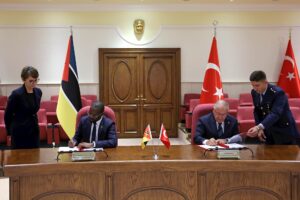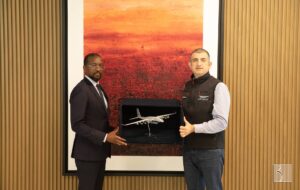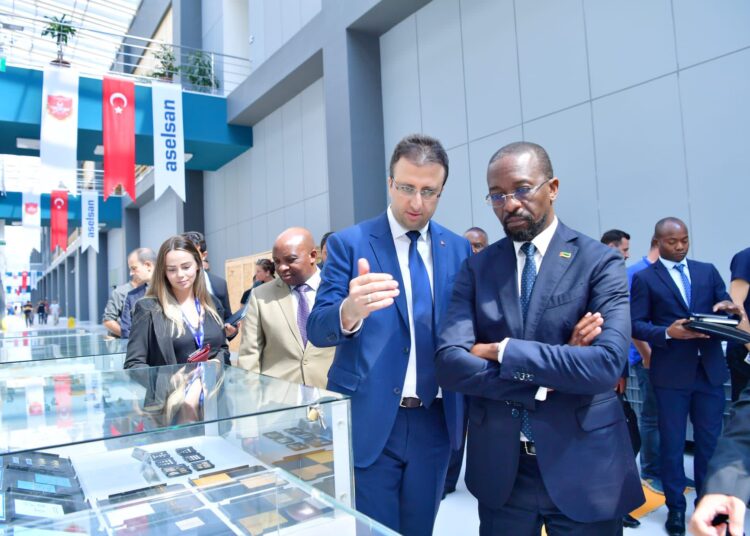Nordic Monitor/Stockholm
Turkey is poised to approve a comprehensive military agreement with the southern African nation of Mozambique that includes an exchange of military intelligence to be coordinated by the respective military intelligence agencies of both countries.
The agreement, titled Military Framework Agreement between the Republic of Türkiye and the Republic of Mozambique, encompasses a wide range of cooperation areas, including training, personnel exchange, military intelligence sharing, joint operations and collaboration in logistics, communications, electronics, information systems and cyber defense.
The agreement follows increased interest from African nations in procuring sophisticated military hardware from Turkey, including armed drones. Mozambican Minister of Defense Cristóvão Artur Chume made an official visit to Turkey in September 2023 during which he had discussions with his Turkish counterpart and visited leading Turkish defense contractors.
It was during this visit that the military framework agreement was signed by Minister Chume and his Turkish counterpart, Yaşar Güler. This agreement will also facilitate the donation, sale and lease of military equipment to Mozambique.
The Mozambican defense minister visited the Presidency of the Defense Industry (SSB), an entity that was sanctioned by the United States in December 2020 over Turkey’s purchase of a Russian missile defense system. Following an inter-delegation meeting, SSB President Haluk Görgün and Minister Chume signed a defense industry cooperation agreement outlining the fundamental principles of collaborative defense industry activities between the two countries.
The Mozambican delegation also visited Baykar, a drone manufacturer led by Selçuk Bayraktar, the son-in-law of Turkish President Recep Tayyip Erdogan. Baykar has secured significant contracts not only with the Turkish government but also with foreign countries, largely due to the substantial support it receives from Erdogan. The president actively promotes the sale of drones to the Turkish Armed Forces and foreign countries, contributing to Baykar’s booming profits from sales in both domestic and international markets.
The delegation also visited state-owned defense contractor Aselsan, known for its diverse product range, which includes communications and information technologies, radar and electronic warfare systems, electro-optics, avionics, unmanned systems, land and naval equipment, air defense and missile systems and command and control systems as well as solutions for transportation, security, traffic management, automation and healthcare technologies.
Full text of the Turkey-Mozambique Military Framework Agreement:
According to Turkey’s state-run Anadolu news agency, Mozambique is interested in designating Turkey as a strategic partner. The agreement will pave the way for such a designation, allowing Turkey to send military advisors and technical teams to assist the African nation in developing its military capabilities.
The military framework agreement includes joint military exercises between the armed forces of both countries, including real firing drills. Additionally, the Turkish navy would be permitted to make port visits to Mozambican ports. The exchange of military intelligence will be conducted through secure channels and coordinated by the chiefs of military intelligence of both nations.
Both countries can file a request to obtain military intelligence from the other, but such requests are subject to conditions. “The request for the exchange of military intelligence information shall be assessed on a case-by-case basis and may be rejected if it endangers the national sovereignty and security of one of the Parties or significantly contradicts its national or international interests,” the agreement states.
In the event of a dispute regarding the implementation of any provision in the agreement, both Turkey and Mozambique have agreed that such disputes shall be settled through consultations and negotiations rather than by the courts or a third party. The agreement is valid for five years, with automatic one-year extensions unless either party declares in advance its intention to terminate the agreement.
In the last decade, Turkey has intensified its campaign of signing military and defense industry agreements with a number of African nations. These agreements involve the sale of military hardware, the deployment of troops and the promotion of its foreign policy objectives.

African countries are increasingly attracted to Turkish weapons, particularly drones, due to the ease and efficiency of the sales procedures and approval processes.
Turkey does not impose any political or human rights conditions on the sale of weapons and ammunition. This is convenient for African countries as they often face lengthy and complicated procedures, needing approval from their respective parliaments to buy weapons from Western partners.
Another contributing factor is that many companies operating in the defense industry are owned by businessmen close to President Erdogan’s inner circle, facilitating smoother transactions and negotiations.
Turkey’s drone sales have been highlighted in UN reports for their violations of embargoes in Libya and Somalia in recent years.
Turkish president’s letter to parliament asking for ratification of the military agreement with Mozambique:
Turkish-Ethiopian military relations came to the international agenda after the Ethiopian army, on January 7, 2023, targeted a primary school building filled with children, women and elderly men using drones purchased from Turkey. At least 59 civilians were killed, and dozens more were injured in the attack. Until that time, Turkey was not known to have sold drones to Ethiopia. Weapons remnants recovered from the site were determined to be MAM-L (smart micro munition) guided bombs produced by Turkey’s Roketsan and paired exclusively with Turkish-made Bayraktar drones.
The Turkish president submitted the military framework agreement between Turkey and Mozambique to parliament for approval on April 4. The parliament speaker referred the agreement to the Foreign Affairs Committee on April 16 for debate. It is expected to clear both the committee and the general assembly with no major hurdles.













